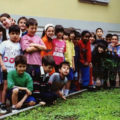What with all the fuss in the US about sex education in schools, I was curious to know what, if anything, would be done about it in Italian schools. I got my answer recently, when Ross’ class [then age 15] had two 3-hour sessions at school. Parents were not notified before or after, and wouldn’t have known it was happening unless their kids told them. Ross told me quite a bit about it, though I’m not prepared to swear that she told me everything.
A representative of the local health agency (ASL) came with a young woman who was observing as part of her psychology studies. There was an icebreaker in which the kids (mostly jokingly) introduced each other, then an exercise in which they were told a story about a girl who needs to get across a river to see her boyfriend. The boatman says he’ll take her if she’ll have sex with him. She has no other way to reach her boyfriend, so she doesn’t know what to do. She goes to her mother, who says she doesn’t want to be involved.
The girl finally resolves to have sex with the boatman. When she reaches her boyfriend she tells him what happened, and he rejects her for having sex with someone else. The class was asked to determine who, in this improbable story, is “responsible.” (Whether they were meant to address “responsibility” in the sense of who was responsible for what happened, or in the sense of behaving responsibly, was not clear – perhaps deliberately.)
Ross told me that this degenerated into a vicious argument over abortion – “Who would be responsible if she got pregnant?”. Lecco is a very Catholic town, and the ASL lady told the class that, although abortion is legal, they would have trouble finding anyone in Lecco to perform one. I guess it’s good to be warned; fortunately, Milan is easily reached, should the need arise. More importantly, local health authorities are taking the correct steps to prevent the *need* for abortion: the kids were given detailed information on birth control and the use of condoms for disease prevention as well as birth control. They were also told that they can go to a youth clinic at their local ASL for more information, with or without their parents’ knowledge. The ASL lady said that they do try to involve parents in any big decisions (such as abortion), but that the kids have the right to keep their parents out of it if they prefer.
Interestingly, abstinence was never mentioned. I asked Ross why she thought the ASL lady didn’t discuss it as an option. “Oh, everyone would have jumped all over her.” It was clear that a number of the kids are already sexually active, and no judgment upon them was given or implied. Wow. Health care professionals who are allowed to approach teen sex realistically. What a concept.
I’m very relieved that the ASL takes these initiatives. As far as Ross and I can tell, I’m the only mother among her friends who talks to her kid about sex, and, from what Ross tells me, dangerous misinformation abounds among her Italian peers. If the parents aren’t talking to these kids, someone has to –the stakes these days are life and death. Ross’ friends know that I talk to her (I’m considered the coolest mom in Lecco for several reasons, including that), so I hope they’d feel comfortable talking to me if they needed to, but I’m glad someone more authoritative and knowledgeable is there for them – it diminishes my risk of being lynched by the good parents of Lecco!
^ Top: Sex education doesn’t stop at school. The public health poster shown above says “Defend yourself from AIDS, not from someone you like. Age does not save you from the risk of contagion.”






